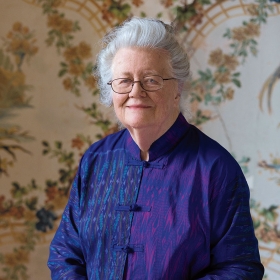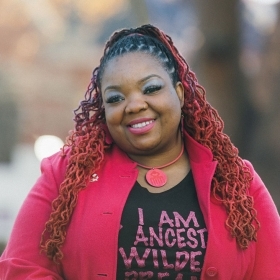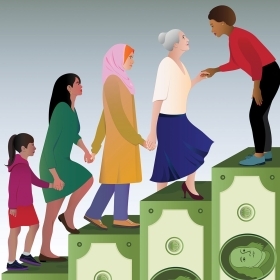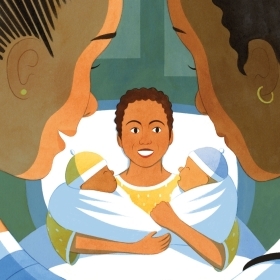Peggy McIntosh to be inducted into the National Women’s Hall of Fame
In January, Peggy McIntosh, a senior research scientist at the Wellesley Centers for Women (WCW) and its former associate director, received an exciting call from Jean Kilbourne ’64. “Welcome to the National Women’s Hall of Fame,” Kilbourne told McIntosh, notifying her that she would be inducted in September.

Peggy McIntosh on Cheever House’s grand staircase with original wallpaper and bannister dating from 1894
In January, Peggy McIntosh, a senior research scientist at the Wellesley Centers for Women (WCW) and its former associate director, received an exciting call from Jean Kilbourne ’64. “Welcome to the National Women’s Hall of Fame,” Kilbourne told McIntosh, notifying her that she would be inducted in September.
Kilbourne nominated McIntosh for her work creating the National SEED Project (Seeking Educational Equity and Diversity) and for her research on equity and privilege, including her canonical 1988 and 1989 papers, “White Privilege and Male Privilege: A Personal Account of Coming to See Correspondences through Work on Women’s Studies” and “White Privilege: Unpacking the Invisible Knapsack.” (Kilbourne, a senior scholar at WCW, was inducted into the hall herself in 2015 for her work studying images of women in advertising and received Wellesley’s Alumnae Achievement Award the same year.)
McIntosh came to Wellesley in 1979 to facilitate a series of seminars for college and university faculty members, funded by the Andrew W. Mellon Foundation, on incorporating scholarship on women into all liberal arts disciplines. McIntosh, who has a B.A. from Radcliffe and a Ph.D. in English from Harvard, was chosen in part because of her work as co-founder of the Rocky Mountain Women’s Institute. The institute gave “money and a room of one’s own” to women to work on art and other projects, as well as the opportunity to share their ideas in a noncompetitive context.
McIntosh wasn’t quite prepared for the academics in the Mellon seminars who were “goading each other, critiquing each other, and having to defend themselves,” she says. “I felt this was a really bad use of analytical skill.” Over time, she developed the technique of serial testimony as a method of discussing sensitive topics: The group sits in a circle, and each person speaks in turn for a short, prescribed time from their personal experience. Word spread about McIntosh’s work, and schoolteachers asked if they could participate. So McIntosh secured funding to allow K–12 educators to attend monthly seminars that she facilitated around the Northeast.
After several years and a couple of canceled flights, McIntosh realized that other teachers could fill in for her as facilitators. “Bad weather really nationalized the project,” says McIntosh. In 1987, SEED was launched as an annual weeklong summer teacher training program and “the whole thing expanded like an airbag,” McIntosh says. Today, more than 2,900 teachers from 45 U.S. states and 15 other countries have become SEED seminar facilitators, engaging more than 30,000 teachers.
As McIntosh was conducting the Mellon seminars, she was also learning about male privilege and its parallels to white privilege. For example, one “nice man” in a seminar pushed back against the idea of including more women in classes. “He said the syllabus is already so full; we can’t put in extras,” McIntosh says. “Extras! And none of us women said anything!” She began to think of the image of an all-male syllabus expanding to fill the room, making “men appear double their actual size to themselves and to us.” That echoed in her mind with something that women of the Combahee River Collective, a Black feminist lesbian organization outside Boston, had told her. “They were finding that white women had very little interest in what they had to say or what experience they had … white women were quite, as we used to say in the ’50s, clueless,” she says.
McIntosh began to compare her daily life to those of her friends and colleagues of color, and built a list of things that she, a white woman, could do, starting with No. 1: “I can if I wish arrange to be in the company of people of my race most of the time.” By the time she got to No. 25, “If a traffic cop pulls me over or if the IRS audits my tax return, I can be sure I haven’t been singled out because of my race,” she began to feel that she had embarked on the most important work she’d do in her life.
McIntosh credits the Wellesley Centers for Women for making it possible. “I couldn’t have done the work I did anywhere else,” she says. “The award from the Hall of Fame derives directly from the fact that Cheever House was an ideal place for me to have ideas taken seriously, get support in funding them and in writing grant proposals, and then disseminating the results.” At the WCW, McIntosh says, “We were encouraged to follow our knowledge and our imagination wherever it will lead us.”


